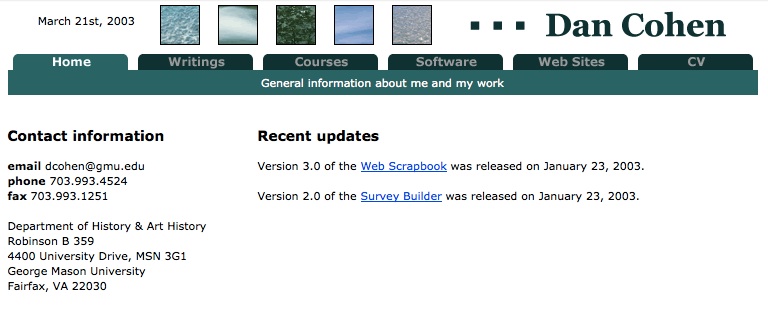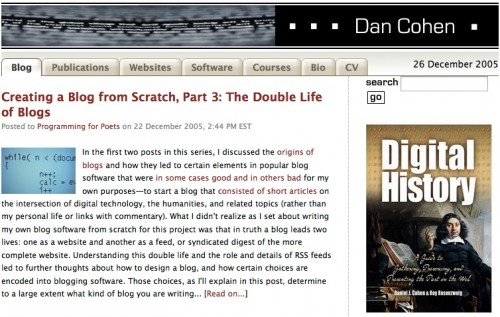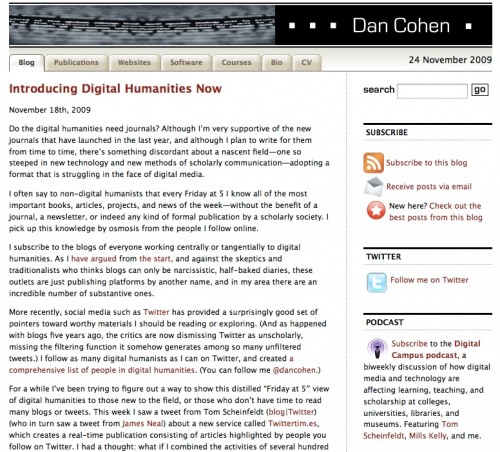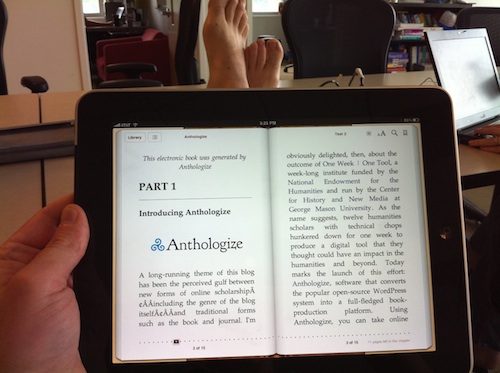One of the most-read pieces I’ve written here remains my entreaty “Professors Start Your Blogs,” which is now 12 years old but might as well have been written in the Victorian age. It’s quaint. In 2006, many academics viewed blogs through the lens of LiveJournal and other teen-oriented, oversharing diary sites, and it seemed silly to put more serious words into that space. Of course, as I wrote that blog post encouraging blogging for more grown-up reasons, Facebook and Twitter were ramping up, and all of that teen expression would quickly move to social media.
Then the grown-ups went there, too. It was fun for a while. I met many people through Twitter who became and remain important collaborators and friends. But the salad days of “blog to reflect, tweet to connect” are gone. Long gone. Over the last year, especially, it has seemed much more like “blog to write, tweet to fight.” Moreover, the way that our writing and personal data has been used by social media companies has become more obviously problematic—not that it wasn’t problematic to begin with.
Which is why it’s once again a good time to blog, especially on one’s own domain. I’ve had this little domain of mine for 20 years, and have been writing on it for nearly 15 years. But like so many others, the pace of my blogging has slowed down considerably, from one post a week or more in 2005 to one post a month or less in 2017.
The reasons for this slowdown are many. If I am to cut myself some slack, I’ve taken on increasingly busy professional roles that have given me less time to write at length. I’ve always tried to write substantively on my blog, with posts often going over a thousand words. When I started blogging, I committed to that model of writing here—creating pieces that were more like short essays than informal quick takes.
Unfortunately this high bar made it more attractive to put quick thoughts on Twitter, and amassing a large following there over the last decade (this month marks my ten-year anniversary on Twitter) only made social media more attractive. My story is not uncommon; indeed, it is common, as my RSS reader’s weekly article count will attest.
* * *
There has been a recent movement to “re-decentralize” the web, returning our activities to sites like this one. I am unsurprisingly sympathetic to this as an idealist, and this post is my commitment to renew that ideal. I plan to write more here from now on. However, I’m also a pragmatist, and I feel the re-decentralizers have underestimated what they are up against, which is partially about technology but mostly about human nature.
I’ve already mentioned the relative ease and short amount of time it takes to express oneself on centralized services. People are chronically stretched, and building and maintaining a site, and writing at greater length than one or two sentences seems like real work. When I started this site, I didn’t have two kids and two dogs and a rather busy administrative job. Overestimating the time regular people have to futz with technology was the downfall of desktop linux, and a key reason many people use Facebook as their main outlet for expression rather a personal site.
The technology for self-hosting has undoubtedly gotten much better. When I added a blog to dancohen.org, I wrote my own blogging software, which sounds impressive, but was just some hacked-together PHP and a MySQL database. This site now runs smoothly on WordPress, and there are many great services for hosting a WordPress site, like Reclaim Hosting. It’s much easier to set up and maintain these sites, and there are even decent mobile apps from which to post, roughly equivalent to what Twitter and Facebook provide. Platforms like WordPress also come with RSS built in, which is one of the critical, open standards that are at the heart of any successful version of the open web in an age of social media. Alas, at this point most people have invested a great deal in their online presence on closed services, and inertia holds them in place.
It is psychological gravity, not technical inertia, however, that is the greater force against the open web. Human beings are social animals and centralized social media like Twitter and Facebook provide a powerful sense of ambient humanity—the feeling that “others are here”—that is often missing when one writes on one’s own site. Facebook has a whole team of Ph.D.s in social psychology finding ways to increase that feeling of ambient humanity and thus increase your usage of their service.
When I left Facebook eight years ago, it showed me five photos of my friends, some with their newborn babies, and asked if I was really sure. It is unclear to me if the re-decentralizers are willing to be, or even should be, as ruthless as this. It’s easier to work on interoperable technology than social psychology, and yet it is on the latter battlefield that the war for the open web will likely be won or lost.
* * *
Meanwhile, thinking globally but acting locally is the little bit that we can personally do. Teaching young people how to set up sites and maintain their own identities is one good way to increase and reinforce the open web. And for those of us who are no longer young, writing more under our own banner may model a better way for those who are to come.




